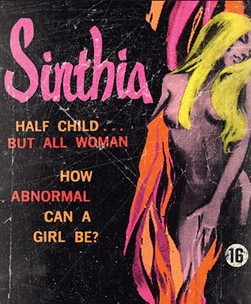 It’s a fact that the late Ray Dennis Steckler made some good movies in his day, but this soft core horror-art film isn’t one of them. It does have an appealingly hallucinatory vibe, however, and the kind of schizophrenic genre-hopping only Steckler could provide.
It’s a fact that the late Ray Dennis Steckler made some good movies in his day, but this soft core horror-art film isn’t one of them. It does have an appealingly hallucinatory vibe, however, and the kind of schizophrenic genre-hopping only Steckler could provide.
SINTHIA THE DEVIL’S DOLL (1970) was one of several seventies era no-budgeters Ray Dennis Steckler directed pseudonymously. SINTHIA is further noteworthy because it was scripted by the late Herb Robins, an exploitation movie staple who acted in several films directed by Steckler, Ted V. Mikels and others, and wrote and directed THE WORM EATERS (1977) and THE BRAINSUCKER (1988).
SINTHIA, FYI, is now out on DVD from Something Weird Video, together the 1970 documentary SATANIS, THE DEVIL’S MASS.
Sinthia suffers from horrific nightmares, having murdered her parents and burned down her family home as a teenager. In the here-and-now a sympathetic shrink is encouraging Sinthia, now a twentyish young woman, to explore her tormented inner world.
This Sinthia does, finding herself adrift in a dark netherworld of fornicating bodies. But then things get freak(ier), with all the participants dividing up and chanting “Sinthia loves her father!” She comes to realize she’s in Hell, and the surrounding people are tortured souls who (like Sinthia) have killed their parents.
Sinthia wakes up on a beachside road. There she’s accosted by a mysterious woman who takes her back to her home, inviting Sinthia to “enter into my world, where all is peaceful.” The woman shows Sinthia her vast collection of modern art and gives her a tarot card reading. As you might guess, the cards don’t portend anything good! Sinthia has a lesbian tryst with the woman and later poses for Lenny, the artist responsible for the paintings on the woman’s wall. Throughout it all Sinthia can’t seem to get the thought of her father out of her head, and even has a dream-within-a-dream that she marries her father (actually Lenny, who she mistakes for her father).
Sinthia comes to in her shrink’s office. He informs her that she has a “very deep feeling of guilt” about killing her parents, and so “therefore your subconscious has produced these terrible nightmares.” His solution? Commit suicide in her dreams! Specifically, she’ll have to be hypnotized to believe she’s back in her childhood home, where she’ll have to die along with her parents.
The problem is that when hypnotized Sinthia winds up back with Lenny (who she can’t seem to keep from mistaking for her father) and the mystery woman, who don’t want her to do as her shrink has advised. From there all is confusion, for Sinthia and the viewer.
SINTHIA, THE DEVIL’S DOLL was credited to “Sven Christian” and is overall not one of Ray Dennis Steckler’s best films (far from it) being essentially in the same league as other hallucinatory sexploiters of the period like BACCHANALE (1970) and BEYOND LOVE AND EVIL (1971).
Nearly all of Steckler’s trademarks are here: the amateurish performances, cheap sets, meandering narrative and schizophrenic genre splicing that makes the viewer constantly feel like he’s watching an entirely different movie. That tendency manifests itself here in what appears to have been intended as a straightforward sexploiter. Indeed that’s how SINTHIA generally plays, but the proceedings, with Steckler’s colorful lighting and disjointed editing, constantly wander into art film territory.
It’s clear that Steckler incorporated a lot of stock footage in SINTHIA, and filmed in a highly improvisatory manner. This explains why (for instance) Steckler cuts from an intense torture sequence to a contemplative scene of Sinthia pondering the motion of waves on a beach. It’s all just as cut-rate and silly as it sounds, but is a must for those who (like me) get a guilty pleasure-kick out of pretentious psychedelic silliness.
Vital Statistics
SINTHIA, THE DEVIL’S DOLL
Sun Art Enterprises
Director: “Sven Christian” (Ray Dennis Steckler)
Producer: Dorothy K. Sonney
Screenplay: Herb Robins
Cinematography: Ray Dennis Steckler
Cast: Shula Roan, Boris Balachoff, Bret Zeller, Gary Kent, Maria Lease, Diane Webber, Herb Robbins, Lynn Levin
